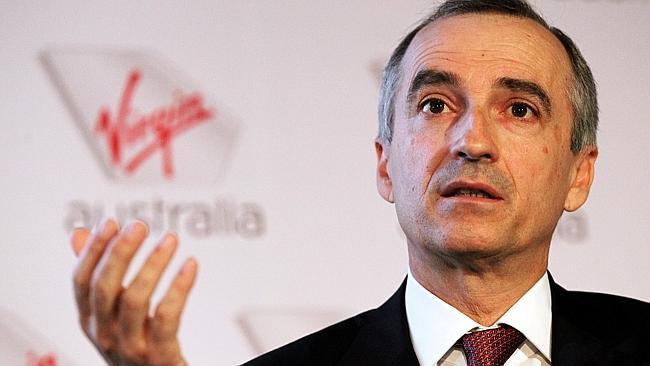Air NZ nerves put Virgin’s future up for grabs
Air New Zealand chief Christopher Luxon has either lost faith in Virgin Australia, or lost his nerve.

It is self-evident that Air New Zealand’s Christopher Luxon has either lost faith in Virgin Australia’s strategies or lost his nerve. Either way he’s a seller, not the investor Virgin needs as it seeks to recapitalise in the face of continuing heavy cash outflows.
Just over a week ago Air NZ, as Virgin’s largest shareholder, contributed $131.2 million of a $425 million loan facility Virgin’s core strategic shareholders made available to it to provide liquidity while it conducted a “strategic review” of its capital structure.
Today Air NZ announced it was exploring options for its 25.8 per cent shareholding, including a possible sale of part, or all, of it. As Luxon resigned from the Virgin board his chairman, Tony Carter, told Virgin chairman, Elizabeth Bryan, his airline did not want a large minority equity position in her group. He’s a seller, or at least aspires to be one.
Air NZ’s commitment to Virgin is large in the context of its own balance sheet. Its last accounts show the holding was valued at $422 million. With its share of the loan facility its exposure to Virgin is, at $522 million, about 30 per cent of its own net assets.
Given that it would appear likely that — with $253 million of negative free cash flows in the December half, an equity base of less than $1 billion and financial liabilities of more than $3 billion — Virgin will have to raise more equity, Air NZ’s exploration of its exit options is understandable.
Air NZ was, of course, bailed out by the NZ government after the collapse of Ansett in 2001 and is still 53 per cent state-owned. The scars of that experience remain embedded in its corporate consciousness and were behind Luxon’s comment last year — a comment that upset Virgin — that it was time for the group to get profitable. Air NZ itself is a very cost and profit-conscious airline group.
There have been obvious tensions between Air NZ and Virgin, despite Air NZ’s involvement in the loan facility and its participation, along with Etihad Airways and Singapore Airlines, in the $350 million equity raising in 2013 that stabilised Virgin during its fierce capacity war with Qantas.
There are suggestions that Air NZ had its own finance team inside Virgin at the weekend ahead of today’s announcement.
Luxon and his board would be concerned that six years after John Borghetti embarked on his radical transformation of Virgin into a full-service brand and acquired Tiger Australia and Skywest to match the Qantas multibrand offering the cash is still leaking badly from the group despite the dramatic fall in fuel costs and the cessation of the capacity war with Qantas.
The problem for Air NZ and Virgin shareholders more generally is that Borghetti has undoubtedly created a far better airline with the heavy investment in product, lounges and brands but Virgin has yet to demonstrate it is a good business.
That might come, now that the Borghetti game plan that transformed Virgin, with very substantial investment, from a low-cost carrier focused mainly on leisure routes is essentially complete. Air NZ’s actions, however, suggest it has doubts.
The Air NZ camp would have wanted reassurance that Virgin’s existing shareholder capital, let alone any new capital provided, could generate positive and acceptable returns within a reasonable time frame. The subtext to today’s announcement is that they saw better opportunities in deploying their capital elsewhere than lifting their already overly-large exposure to Virgin.
Air NZ is about $90 million under water on the shareholding at current market levels but presumably hopes that it can exploit the tight nature of Virgin’s register to extract some level of premium.
Etihad has a 24.2 per cent stake in Virgin and Singapore a 22.7 per cent interest, while Richard Branson’s Virgin Group owns about 10 per cent.
Both Etihad and Singapore, like Air NZ, have alliances with Virgin and strategic reasons for being on the register.
Singapore has long coveted a big exposure to the Australian domestic market (it had agreed to buy Ansett before Air NZ snatched it) and also badly wants access to the trans-Pacific routes that Virgin flies.
Etihad, like all the Middle East hub airlines, wants a larger share of the big flows of traffic into and out of this market. Qantas’ joint venture with Emirates has shown how valuable capturing those flows, or a large exposure to them, can be.
If Air NZ does manage to quit the register, both of them would have to seriously consider whether they could — and wanted to — gain control of Virgin. Virgin has an unusual, and somewhat artificial, corporate structure that separates the ownership of its international business and its valuable bilateral rights from its domestic business.
The international business is technically Australian owned but the domestic business and the economic exposure to the international operations are more than 80 per cent owned by the strategic foreign shareholders. Ownership of the group by one foreign airline, or even a partnership between two, would create some interesting discussions in Canberra.
The Air NZ position will complicate Virgin’s own recapitalisation options, given that there is now a $350 million or so shareholding overhanging the market in its shares along with a need to find at least that amount of new equity if its balance sheet is to be shored up.
It may also need to refinance ostensibly cheap US dollar-denominated debt with Australian dollar funding to better match its assets, income and liabilities.
Virgin’s review of its capital structure will need to be broad and ultimately definitive and as much about its business strategy as the relationship and nature of its debt and equity.
Virgin has to have a strategy for stopping the haemorrhaging of cash if it wants to attract the capital, debt and equity, that the loan facility its key shareholders provided just over a week ago signalled it needs.




To join the conversation, please log in. Don't have an account? Register
Join the conversation, you are commenting as Logout